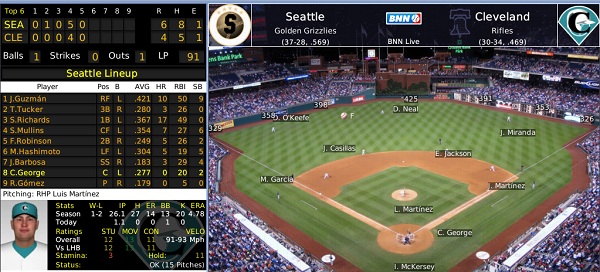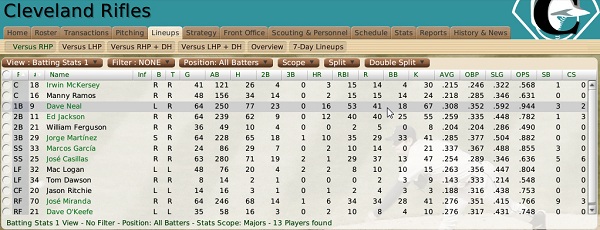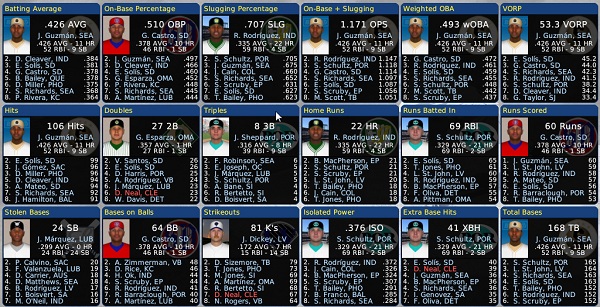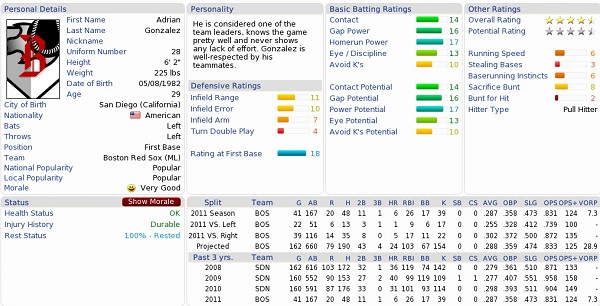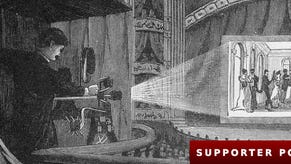Bat-To-Ball: Out Of The Park Baseball 13
I may be the one of the few men in England who cares that the new baseball season has just begun over in UnitedStatesVille, USA but I'm surely not the only sports simulation fan to be intrigued by the release of Out of the Park Baseball 13. As with many sports games, the annual releases tend to involve incremental improvements, roster changes and the addition of minor features rather than radical alterations.I'll list the tweaks to the formula below but, more importantly, I'll tell you why the series matters and why baseball itself is such a wonderful gift to lovers of all things simulated.
Baseball isn't about large men grunting and sweating, feigning injury and celebrating with equal mixtures of disrespect and machismo. It isn't about millionaires being paid to play a game that they presumably enjoy and it isn't about buying success or jumping from franchise to franchise, caring for the contract rather than the club. You could make an argument that it's all of those things, as well as being a series of pauses only occasionally interrupted by action and excitement, but here's another way of looking at it.
Baseball is a sport of stats, a nonstop carnival of percentages and decimal places that sets up across the States every year from Spring to Autumn. A seasoned watcher of bat-to-ball can read the boxscore of a game and all but see every hit and error as they played out. Those aren't large men grunting and sweating; they are mathematical constructs, their quantities and qualities calculated in the aftermath of the thousands of balls they have pitched, batted, fielded and fumbled. But, of course, no calculation is perfect and it's that element of luck, that possibility of a moment of unpredictable brilliance, or the shocking flub of a veteran.
There's a reason that the numbers matter more than in other sports. Many reasons, actually, two of which I'll dissect just a little. The first is the number of games that take place in a season and therefore a career, and tied to that is the more than a century old archive to which every statistic is added, an ever-accumulating encyclopaedia of numerical knowledge. Basically, it's a game that produces a lot of numbers, which means that it's easier to see patterns in those numbers, easier to make sense of averages.
The game's other stat-friendly quality is that, on the whole, although a team game, it's also a match of individuals against one another, or at least individuals applying their skills almost independently. A pitcher has a fielding staff to provide coverage of the field and a catcher to flash signs at him, but its his arm that is tested again and again throughout a match, throughout a season. Likewise, when batting a player's eye is called into question, his ability to read intent, his understanding of the pitcher's history, temperament and talents. All of this makes the numbers that accrue around each player a more accurate descriptor than, say, the number of assists a winger manages to lay on during a season of foot-to-ball.
And that's why Out of the Park Baseball is such a fascinating simulation. It's mostly numbers, although the storylines that develop outside the games themselves have been made interactive with this latest version, providing more character and narrative impetus. Like Football Manager, it's a game that simulates an entire world, although Out of the Park goes much deeper with its simulation, allowing for the creation of historical and fictional leagues. Play from any point in the history of the sport, with strategies evolving and league expansions happening as they did in real life. Or, better still, begin a fictional league in the nineteenth century and allow it to develop, with rules changing, franchises being added and legends being discovered.
Simulating the entire history of a sport from its origins to an alternate modern day is a uniquely powerful use of number crunching and, like almost everything that I enjoy, it's a perfect framework on which to hang a thousand stories. The first member of your team inaugurated into the Hall of Fame, a mark left on the world for as long as that world exists, or the promising rookie blighted by injury, never achieving what you knew he was capable of.
I just noticed that a press release for the game informs me that "players in OOTP are not just numbers" and I realise I've spent many a word describing how actual baseball players are numbers. I take their point but it's the numbers that matter, to me, because stitch enough of them together, pit them against one another in a complex simulation, and numbers can tell a story just as well as words can. That's what a simulation of this quality and depth proves.
So, the new version is out. I haven't played it yet so can't tell you whether the additions are notable or not. New rosters are in place, of course, as is a realtime simulation mode, AI improvements, a redesigned interface and a historical mode with real players randomly inserted, rather than debuting as they did in reality. More details on all the additions here.
It's £26.74, which is about 10p for every hour I'll probably end up sinking into it if you see any value in applying such calculations to your entertainment. While there isn't a demo available yet, the previous version does have a trial that you can grab for Windows here, or for Linux and Mac here.

